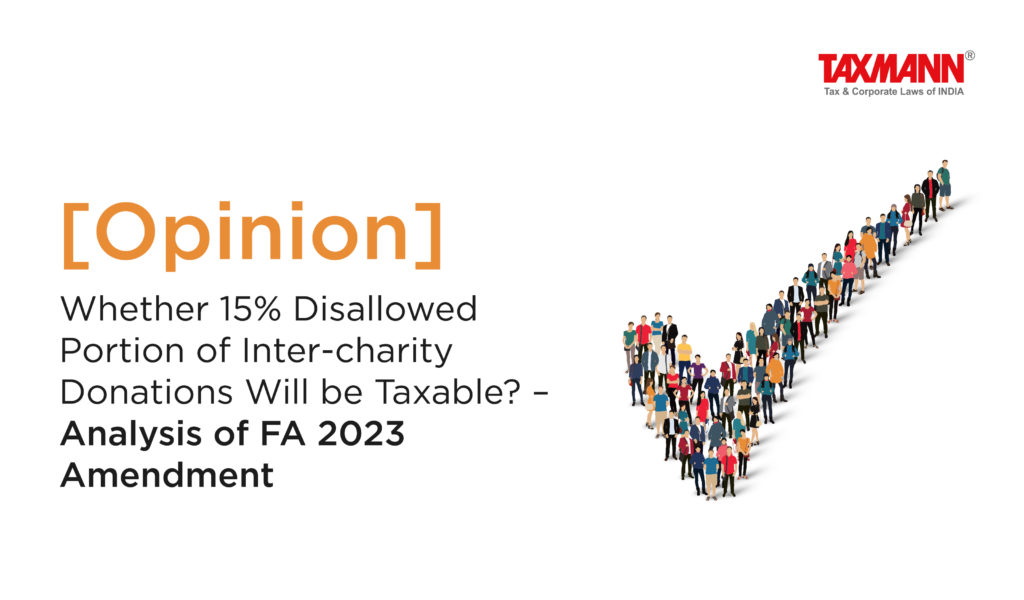[Opinion] Whether 15% Disallowed Portion of Inter-charity Donations Will be Taxable? – Analysis of FA 2023 Amendment
- Blog|News|Income Tax|
- 2 Min Read
- By Taxmann
- |
- Last Updated on 22 August, 2023

Adv. (Dr.) Manoj Fogla, CA. Suresh Kumar Kejriwal & CA. Tarun Kumar Madaan – [2023] 153 taxmann.com 488 (Article)
1. Introduction and Background
The Finance Act 2023 inserted clause (iii) in Explanation 4 to Section 11(1) w.e.f. assessment year 2024-25. By virtue of this amendment, only 85% of the eligible donations made by a trust or institution registered under Section 12AB to another trust or institution registered under Section 12AB or approved under Section 10(23C) shall be treated as the application of income. In simpler terms, if one charitable organisation provides a grant of Rs. 100 to another charitable organisation, only Rs. 85 will now be deemed as the application of income. Hence, this amendment has given rise to controversy regarding the potential tax liability attached to the remaining Rs. 15.
The question of law is whether the disallowance of the 15% accumulation, as per the new Clause (iii) in Explanation 4 to Section 11(1), will lead to tax liability, given the absence of an actual available amount for accumulation. Consequently, a pertinent question arises: Should the disallowed 15% portion of the donation be classified as taxable income?
In our opinion, as analysed in this article, there will be no tax implication on the organisation for such disallowance.
2. Understanding the concept of 85% application and 15% accumulation of income
A charitable and religious trust is subject to tax in accordance with the provisions of Section 11 to Section 13. A trust deriving income from a property held under trust for charitable or religious purposes is not included in its total income if such income is applied for charitable purposes in India. The income of trusts and institutions is exempt under Section 11/12, provided a minimum of 85% of the income is utilised during the year for charitable or religious purposes and a maximum of 15% of the income can be accumulated, unconditionally.
Click Here To Read The Full Article
Disclaimer: The content/information published on the website is only for general information of the user and shall not be construed as legal advice. While the Taxmann has exercised reasonable efforts to ensure the veracity of information/content published, Taxmann shall be under no liability in any manner whatsoever for incorrect information, if any.

Taxmann Publications has a dedicated in-house Research & Editorial Team. This team consists of a team of Chartered Accountants, Company Secretaries, and Lawyers. This team works under the guidance and supervision of editor-in-chief Mr Rakesh Bhargava.
The Research and Editorial Team is responsible for developing reliable and accurate content for the readers. The team follows the six-sigma approach to achieve the benchmark of zero error in its publications and research platforms. The team ensures that the following publication guidelines are thoroughly followed while developing the content:
- The statutory material is obtained only from the authorized and reliable sources
- All the latest developments in the judicial and legislative fields are covered
- Prepare the analytical write-ups on current, controversial, and important issues to help the readers to understand the concept and its implications
- Every content published by Taxmann is complete, accurate and lucid
- All evidence-based statements are supported with proper reference to Section, Circular No., Notification No. or citations
- The golden rules of grammar, style and consistency are thoroughly followed
- Font and size that’s easy to read and remain consistent across all imprint and digital publications are applied



 CA | CS | CMA
CA | CS | CMA
